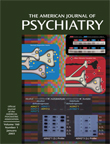Abnormal Sequencing of Motor Actions in Patients With Schizophrenia: Evidence From Grip Force Adjustments During Object Manipulation
Abstract
OBJECTIVE: During object manipulation, grip force must be adjusted in anticipation of destabilizing load forces to prevent the object from slipping. This study used three gripping tasks to assess whether schizophrenia affects the predictive mechanisms required for the scaling, timing, and/or sequencing of motor actions. METHOD: Sixteen patients with schizophrenia and 16 comparison subjects matched for age, sex, and educational level 1) lifted objects of various mass and texture (lift task) and 2) used a manipulandum to hit (hit task) or resist (resist task) impacts produced by a collision with a pendulum. For an optimized performance, all tasks demanded a predictive increase in grip force and the timing of external events. The fluid sequencing of finger and hand submovements was required for the lift and the hit tasks but not for the resist task. RESULTS: Patients were impaired in the smooth execution of both the lift and the hit tasks but not in the performance of the resist task. In all three tasks, the scaling of grip force was similar for patients and comparison subjects. CONCLUSIONS: Schizophrenia is associated with a specific deficit in the sequencing of motor actions rather than with an overall problem in the predictive control of movement.



